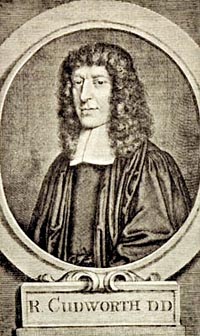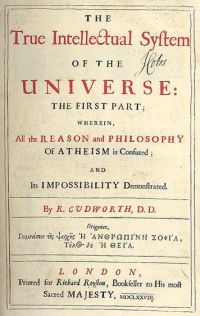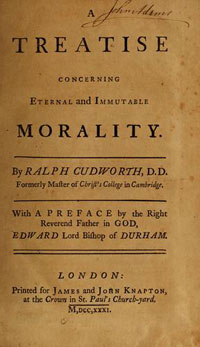



Ralph Cudworth
Aller 1617 - Cambridge 1688
Filosofo e teologo inglese, studiò a Cambridge; professore di ebraico (1645), nel 1654 fu eletto rettore del Christ’s College. Nonostante i legami col governo repubblicano, non subì ritorsioni dopo la restaurazione monarchica e ottenne il beneficio di Gloucester nel 1678. Fu uno dei protagonisti della rinascita del platonismo nella filosofia inglese del Seicento, in aperta contrapposizione con le tendenze meccanicistiche hobbesiane e le correnti deistiche.
Opere principali: A Discourse concerning the True Notion of the Lord’s Supper (1642); The Union of Christ and the Church, in a Shadow (1642); The True Intellectual System of the Universe (1678); Treatise on Eternal and Immutable Morality (1731); Treatise on Free Will (1838); The True Intellectual System of the Universe: the first part, wherein all the Reason and Philosophy of Atheism is confuted and its impossibility demonstrated (1678); A Treatise concerning eternal and immutable Morality (1731); A Treatise of Freewill (1838).
Bibliografia: L. Gysi, Platonism and Cartesianism in the Philosophy of Ralph Cudworth, Bern, Lang 1962; D.P. Walker, Il concetto di spirito o anima in Henry More e Ralph Cudworth, Napoli, Bibliopolis 1986; G. Musca, «Omne genus animalium». Antichità e Medioevo in una biblioteca privata inglese del Seicento, «Quaderni medievali», XXV, 1988, pp. 25-76; J.A. Passmore, Ralph Cudworth: An Interpretation, Bristol, Thoemmes 1990 (1951); B. Lotti, Ralph Cudworth e l’idea di natura plastica, Udine, Campanotto 2000; A. Gatti, Et in Britannia Plato. Studi sull’estetica del platonismo inglese, Bologna, CLUEB 2001; The Cambridge Platonists, S. Hutton (ed.), in Stanford Encyclopedia of Philosophy; L. Simonutti, Biblioteche anglicane del Sei-Settecento e filosofia d’Oltremanica, in Biblioteche filosofiche private in età moderna e contemporanea, Atti del Convegno di Cagliari, 21-23 aprile 2009, a cura di F.M. Crasta, Firenze, Le Lettere 2011, pp. 109-124.